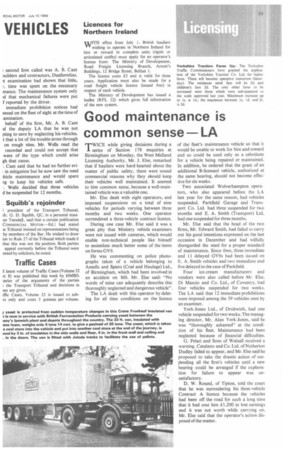Good maintenance is common sense LA
Page 35

If you've noticed an error in this article please click here to report it so we can fix it.
TWICE while giving decisions during a series of Section 178 enquiries at Birmingham on Monday, the West Midland Licensing Authority, Mr. J. Else, remarked that if hauliers were hard-hearted about the matter of public safety, there were sound commercial reasons why they should keep their vehicles well maintained. It seemed to him common sense, because a well-maintained vehicle was a valuable one.
Mr. Else dealt with eight operators, and imposed suspensions on a total of nine vehicles for periods varying between three months and two weeks. One operator surrendered a three-vehicle contract licence.
During one case Mr. Else said it was a great pity that Ministry vehicle examiners were not issued with cameras, which would enable non-technical people like himself to assimilate much better some of the items on forms GV9.
He was commenting on police photographs taken of a vehicle belonging to Ansells and Spiers (Coal and Haulage) Ltd,, of Birmingham, which had been involved in an accident on M6. Mr. Else said: "No words of mine can adequately describe this thoroughly neglected and dangerous vehicle".
The LA dealt with this operator by deleting for all time conditions on the licence of the fleet's maintenance vehicle so that it would be unable to work for hire and reward and so could be used only as a substitute for a vehicle being repaired or maintained. In addition, he ordered that the grant of an additional B-licensed vehicle, authorized at the same hearing, should not become effective for six weeks.
Two associated Wolverhampton operators, who also appeared before the LA last year for the same reason. had vehicles suspended. Parkfield Garage and Transport Co. Ltd. had three suspended for two months and E. A. Smith (Transport) Ltd. had one suspended for three months.
Mr. Else said that the head of the two firms, Mr. Edward Smith, had failed to carry out his good intentions expressed on the last occasion in December and had wilfully disregarded the need for a proper standard of maintenance. Since then, three immediate and 11 delayed GV9s had been issued on E. A. Smith vehicles and two immediate and five delayed in the case of Parkfield.
Four ice-cream manufacturers and vendors were also called before Mr. Else. Di Mascio and Co. Ltd., of Coventry, had four vehicles suspended for two weeks. The LA said that 12 immediate prohibitions were imposed among the 39 vehicles seen by an examiner.
York-Jones Ltd., of Droitwich, had one vehicle suspended for two weeks. The managing director, Mr. Alan York-Jones, said he was "thoroughly ashamed" at the condition of his fleet. Maintenance had been neglected because of financial difficulties.
G. Pelari and Sons of Walsall received a warning. Catalano and Co. Ltd. of Netherton Dudley failed to appear, and Mr. Else said he proposed to take the drastic action of suspending all the firm's vehicles until a new hearing could be arranged if the explana tion for failure to appear was unsatisfactory.
D. W. Round, of Tipton, told the court that he was surrendering his three-vehicle Contract A licence because the vehicles had been off the road for such a long time that it had cost him £1,200 in lost earnings and it was not worth while carrying on. Mr. Else said that the operator's action disposed of the matter.
























































































































